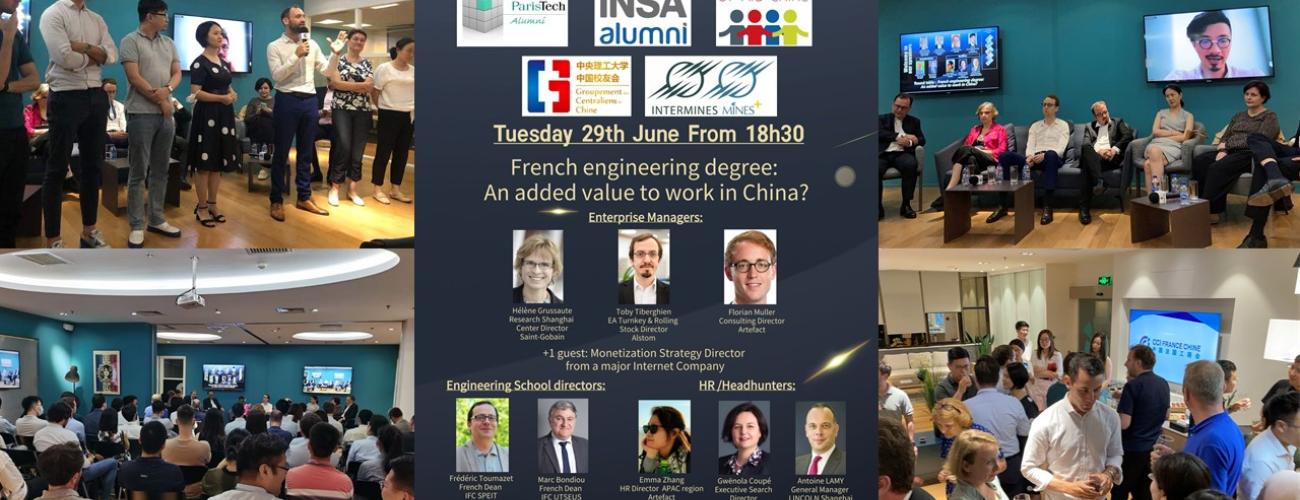
Throwback to the event “French engineering degree: An added value to work in China?”
Event organized by ParisTech Alumni and other alumni networks in Shanghai on June 29, 2021
On the initiative of ParisTech Office in Asia, several alumni networks in China - ParisTech Alumni, INSA alumni, UT Au Chine, Groupement Centraliens Chine, Intermines - organized on June 29 an event dedicated to the French engineering degree in Shanghai.
More than 70 people attended the first event ever jointly organized by five alumni networks in China - ParisTech Alumni, INSA alumni, UT Au Chine, Groupement Centraliens Chine et Intermines - on June 29, in Shanghai. The event, hosted by the French Chamber of Commerce and Industry in China, was dedicated to the French engineering degree. Indeed, if there are plenty of French engineering schools’ alumni, either Chinese or French, and if the schools have been striving in China for more than 20 years by creating Sino-French Institutes for engineering for instance, it is still essential to regularly ponder on the added value of our engineering degree in China so that the stakeholders can adapt to this fast developing country.
Speakers were either schools' alumni working in businesses – Hélène Grussaute (Saint-Gobain, alumna Centrale), Toby Tiberghien (Alstom, alumnus INSA Lyon), Florian Muller (Artefact, alumnus Arts et Métiers), He Lian (Tencent, alumnus Mines ParisTech), recruiters - Emma Zhang (Artefact), Gwënola Coupé (Bo Le), Antoine Lamy (Lincoln), or directors of Sino-French Institutes - Marc Bondiou (alumnus Institut d’Optique) for UTSEUS and Frédéric Toumazet forr SPEIT. The facilitators, Laura Villette, Managing Director of ParisTech in Asia, and Elisabeth Muzeau, General Manager of Techné Sealing Technology in Shanghai and INSA Lyon alumna, successively addressed the following questions: does the French engineering degree (still) have an added value in China? if so what is it? how should we better promote the French engineering degree?
Speakers first defined the French engineering degree : curriculum accredited by the CTI, training program in 5 years (2 years with high level scientific preparatory classes, 3 years dedicated to engineering – scientific specialty, soft skills – project management, communication, foreign languages…-, internships, close links to industry), « a way to think and to open the doors of the future » told Florian Muller.
According to Hélène Grussaute, if the diploma is well known in France, it’s still rather difficult to promote it at international level. It’s still not so well known in China and where there is a strong competition with the best local universities whose excellence is renowned both nationally and internationally.
Engineering schools still have to promote the engineering degree by underlining its specificity: a generalist training allowing graduates to work in all economic sectors, a strong scientific basis and logical thinking. Due to their generalist training, graduates might sometimes miss precise technical competences. Moreover, it is necessary to explain that engineering schools are very selective and that the « diplôme d’ingénieur » is more than a master degree, that it is even more recognized by French companies than PhD, that graduates don’t have any difficulty finding a job. Practice, particularly through internships, is a huge asset. Finally, the international experience gained by the young Chinese engineers who graduate in France is an asset on the Chinese job market and for an international career.
Thanks to the internships during their studies, graduates of the French engineering schools adapt more quickly in companies and are able to move forward faster in their career. They are able to tackle all sorts of challenges, to think critically and out of the box. All extracurricular activities during their studies through the schools' associations for instance, contribute fostering very interesting engineer profiles for companies. Engineers who graduated in France are used to compete as it’s the case in Chinese businesses.
Graduates who obtain a PhD after their diplôme d’ingénieur have a high added value because they are capable of not only working in companies, but also to be innovative because they know the last state-of-the-art in their domain.
Speakers then gave some advice to the audience on their careers: they should know where they want to work/go (R&D, production, sales, management…) to build their own path in their company or by external trainings (MBA…). A manager for instance should have worked in sales to understand what the clients’ needs are.
In conclusion, speakers regretted that French companies in China do not benefit so much from these graduates with international profile. Their salary level is indeed a key issue, young Chinese (or French) engineers who prefer to work where the salary is higher, i.d. in Chinese, US or German companies for instance, even though they acknowledge French companies also have assets (respect of work-life balance, training).
We just all have to make a little more effort for our engineering degrees to benefit from the recognition they deserve!

